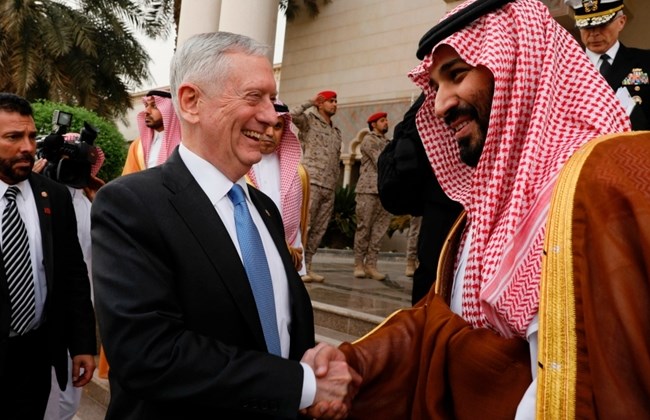When U.S. Defense Secretary Jim Mattis greeted Saudi Arabia’s foreign minister at the Pentagon last month, the first thing he did was joke about the time “the Iranians tried to murder you.” Mattis’ reference to a foiled 2011 plot, denied by Iran, was a telling sign of how much more aligned President Donald Trump’s administration is with Gulf allies about what they perceive to be the Iranian threat, a shift that seems to be setting the stage for greater U.S. involvement in Yemen, in particular.
After long seeking to distance itself from Yemen’s brutal civil war, the United States under Trump now appears increasingly to see the conflict through the Gulf’s prism of Iranian meddling, even as Washington prioritizes a parallel fight against Al-Qaeda. In Saudi Arabia last week, Mattis compared Tehran’s backing for the Houthis to its support for Lebanese ally Hezbollah, a view long espoused by Saudi Arabia and other Gulf states who see links between the two groups. Iran rejects Saudi accusations that it is giving financial and military support to the Houthis in the struggle for Yemen.
Cooperation between the U.S. and the Gulf is already on the rise in the fight against America’s top priority there: Al-Qaeda in the Arabian Peninsula. U.S. officials see that broader civil war as an obstacle to a sustained military campaign against the militants, as well as a threat to the Bab al-Mandab Strait, a strategic waterway.For many U.S. and Gulf observers, the role of Iran is clear in the increasing sophistication of Houthi forces. “These weapons didn’t exist … before the war. There was no explosive boat that existed in the Yemeni inventory,” Vice Adm. Kevin Donegan told Reuters in an interview. Donegan, commander of U.S. Naval Forces Central Command, also said ballistic missiles fired into Saudi Arabia had several times the range of missiles the Yemenis had before the conflict. “When you have a non-nation-state with nation-state-like weapons that can reach into the maritime [area], it has my attention,” Donegan said.
A senior UAE official also compared the Houthis to Hezbollah, and said growing Iranian support had helped shield them from pressure to enter political talks. “We are seeing UAVs, anti-tank and anti-ship missiles, as well as land and sea mines,” the official told Reuters. Mattis has publicly backed a political solution to the conflict. But U.S. officials have also acknowledged that Saudi-led coalition military pressure could help create the conditions for that negotiated solution.
A recent meeting between Trump and Saudi Arabia’s Deputy Crown Prince Mohammad bin Salman was dubbed a turning point in relations which had been frosty under Barack Obama, but some cautioned against too cozy a relationship. Anne Patterson, former deputy assistant secretary of state for Near East affairs under Obama, and who advocated selling the munitions, said the United States should also help Riyadh improve its targeting. But some have expressed caution.
The Source : The Daily Star Lebanon.
خليك معنا

